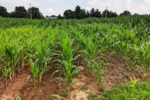Advertise Follow Us
Items Tagged with 'ethanol'
ARTICLES
Check Your No-Till Residue Armor Before Considering Stover Harvest
Measure residue coverage in no-till fields to ensure the soil is protected without inhibiting the planting process or causing future crop emergence and stand issues.
Read More
New Specialty Crops Offer Bonus No-Till Income
Whether it’s soybeans, corn, sunflowers or canola, no-tillers can grow solutions to meet market demand for healthy and renewable oils, as well as more efficient ethanol production.
Read More
Corn Stover Removal And No-Till: A Balancing Act
No-tillers that follow guidelines can remove some stover from continuous-corn fields and still warm up soils, improve nitrogen efficiency and retain organic matter.
Read More









